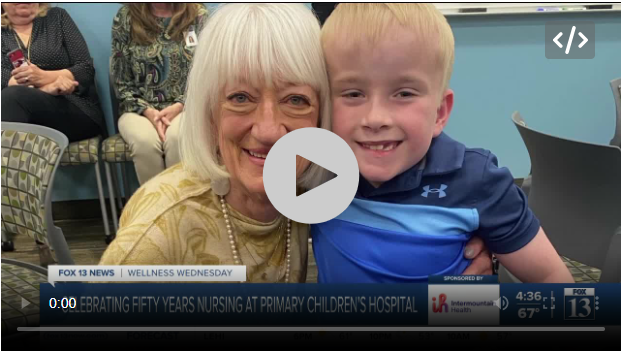
When I heard that Paula Peterson, Primary Children’s Spina Bifida Program Director, had won an award at the recent Spina Bifida World Congress, I wanted to write a story about her. When I learned that she is our most tenured employee, with nearly 50 years of service, I was even more intrigued. Not many people reach such a milestone. When I saw an announcement that she was retiring, I was afraid I wouldn’t have a chance to meet her before she left.
I could have relaxed because Paula’s version of retirement is not an immediate "goodbye." She'll stay at Primary Children’s Hospital in a more limited capacity until at least July 3, when she celebrates her 50th work anniversary. Then, she tells me, she’ll “have another office someplace and continue to work on the research programs and the adolescent transition program.”
Paula began her career with Primary Children’s in 1973, when it was “a little brick hospital on the top of the avenues.” She worked with one pediatric neurologist and a handful of specialists who usually worked with adults. “We didn't have occupational therapy. We didn't have social work. We didn't have psychology. So, over the years that medical team has changed.”
Her team has since expanded to include a social worker, a psychologist, fetal counselors, researchers, neurologists, neurosurgeons, genetic counselors, orthopedists, and even fetal surgeons.
“Nurses are the generalists among all the specialists,” says Paula, who is an advanced practice registered nurse (APRN). “Nursing has the preparation and the experience and the compassion to look at every aspect of the individual, not just a foot, a bladder, a brain. Nurses have the ability to see needs in every area and collaborate with families and see the total effect on a family. I think nursing is a wonderful career.”
The expansion of her team coincided with an expanded vision for children with spina bifida.
“In the past, we were so caught up with, ‘How do we save this baby?’ As opposed to now: ‘How do we help from the very beginning to create a life that has expectations like any other child?’”
Paula Peterson featured on Fox 13 News
Paula remembers that in the early years of her career, there was no warning about spina bifida before the birth. “You would just receive a phone call that a baby was born and brought over to Primary Children's and had spina bifida and needed to be seen by a neurosurgeon.”
Since then, fetal diagnosis has steadily improved over the course of decades and today, at Primary Children’s Grant Scott Bonham Fetal Center, fetal surgery makes it possible to correct spina bifida before a baby is even born. Paula sums it up this way: “So we've come from not knowing anything during the pregnancy to all of that, which is pretty amazing.”
When researchers uncovered the importance of folic acid to prevent spina bifida in the 80s and 90s, Paula headed up a public information campaign to spread the word to mothers. Latex allergy was another emerging issue at the time, and Paula worked to change policies to keep latex away from children at risk.
“Going from latex gloves to other types of gloves wasn't something that just happened overnight. It was a huge undertaking. Same with the folic acid campaign. There were those kinds of things all along the way that spurred me on.”
I asked Paula what advances she hopes are still yet to come in her field. She said, “I want to see pediatric programs really passionate about [pediatric to adult care] transition, not beginning at 14 to 16 years of age, but transition beginning at birth.” She hopes someday we will have “as robust care for the adult population with spina bifida as we have with the pediatric population.”
Paula was the lead author of the 1994 publication, The Transition into Adulthood Begins in Infancy, which Judy Thibadeau, Director of Research and Services for the Spina Bifida Association, describes as a “seminal article…which is still referenced today.”
When Judy Thibadeau presented Paula with the Judy Thibendeau Award at the Spina Bifida World Congress, she said, “All of us here know Paula, and if not by face than by her name and the immense presence she has in the spina bifida world academically and clinically.”
What advice would Paula give to caregivers who are just starting their careers? “I would say, none of this happens overnight. And it happens with strong commitment. The most critical thing are relationships.” Paula pointed out that even advances in science begin with relationships, because it is through your relationships with colleagues and patient families that you come to recognize needs, and that leads to research and innovation.
“Take the challenge to spend the time and time, energy and commitment to make those relationships happen,” said Paula.
| Contributor | |
|
|
April Young-Bennett, MPA |



